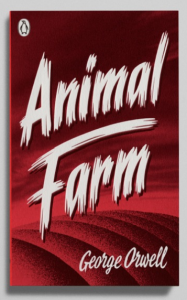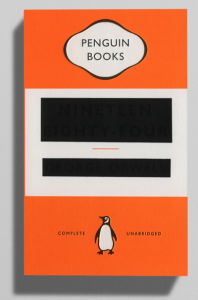 Penguin Books, along with its seriously talented team of graphic designers, is making great play of its latest rebooting of the George Orwell franchise. Coverage from the Huffington Post to the Creative Review lauds Penguin’s brave and high-minded initiative to relaunch Orwell’s works with bold cover designs that recall the original Penguin editions—only, in the case of Nineteen Eighty-Four, with the title erased to signify censorship.
Penguin Books, along with its seriously talented team of graphic designers, is making great play of its latest rebooting of the George Orwell franchise. Coverage from the Huffington Post to the Creative Review lauds Penguin’s brave and high-minded initiative to relaunch Orwell’s works with bold cover designs that recall the original Penguin editions—only, in the case of Nineteen Eighty-Four, with the title erased to signify censorship.
Penguin Classics’ own website states:
“In recognition of one of Britain’s greatest and most influential writers, Penguin Books, the Orwell Estate and The Orwell Prize are launching the inaugural ‘Orwell Day’ on 21st January with new editions of his most beloved books designed by David Pearson. The annual event will serve to celebrate [Orwell’s] writing in all its forms and explore the profound influence he has had on the media and discourse of the modern world.”
Well … perhaps so.
 Only, remember that Orwell has more recently been one of the poster boys for the global fiasco surrounding extension of creative copyright and public domain status across different jurisdictions. Nineteen Eighty-Four itself is in copyright until 2020 in the EU; until 2044 in the U.S.; but already out of copyright and available for download, absolutely free, in Australia, Canada, South Africa, and yes, even in Russia.
Only, remember that Orwell has more recently been one of the poster boys for the global fiasco surrounding extension of creative copyright and public domain status across different jurisdictions. Nineteen Eighty-Four itself is in copyright until 2020 in the EU; until 2044 in the U.S.; but already out of copyright and available for download, absolutely free, in Australia, Canada, South Africa, and yes, even in Russia.
Remember too that Nineteen Eighty-Four was the subject of the notorious case in 2009 when Amazon remotely deleted an edition that had failed to clear U.S. rights from its e-readers.
Yes, Penguin absolutely has the right—if any publishing house has—to do itself proud on its iconic cover designs. Those designs are monuments in and of themselves, and Penguin is certainly entitled to extract from them the maximum value they can. Penguin can also take pride in its own great Sir Allen Lane tradition as a promulgator of knowledge and cultural values (though remember that the house is now in the hands of Pearson PLC, and soon to be snapped up by Random House).
But don’t forget: Penguin was also one of the last major publishers to settle with the U.S. Department of Justice over the “agency model” charges of conspiracy to raise prices on e-books. Indeed, Penguin is still defending the agency model in its statements, while agreeing to settle only in order to consummate its marriage with Random House undisturbed.
So while Penguin and its designers pat themselves on the back over their consecration of Orwell’s memory, the publisher continues to defend the principle of charging top dollar for access to his ideas—even though those same works are completely free elsewhere—and to defend a system that prosecutes those who make those ideas freely accessible, anywhere within its reach.
Yes, a situation where an e-book publisher can erase entire libraries at the press of a button following a court decision is Orwellian. Just as Orwellian—or Kafkaesque—is the global copyright term situation. Are U.S. Customs thought police going to patrol the Canadian border until 2044 to confiscate copyright-free Canadian editions of Nineteen Eighty-Four? Are they going to go after U.S.-based servers that provide access to work that is totally legal elsewhere? Are they going to push cross-border jurisdiction on the model of the U.S. tax authorities and go extraterritorial, to enforce U.S. copyright practices worldwide, at the behest of Big Media? That would be truly worthy of Oceania.
The Australian, Canadian and other archives who are making Orwell’s thought and work freely available are the only ones who are truly honouring his memory, and living up to his ideals. Penguin, meanwhile, seems blind to the Orwellian irony of what it is doing.
































Calm down. I doubt the publisher had much to do with Amazon’s remote erasure of 1984 from Kindles. At the time, I got the impression it was a panic reaction from “the world’s largest bookstore.” I suspect the Orwell estate would have been happy to get after-the-fact royalties.
Next, at the risk of pointing out the obvious, even though I think what Amazon did was stupid, there’s no way to spin its remote erasure as censorship. Those ebooks were stolen goods, and it’s certainly not wrong to require someone who has inadvertently received stolen goods to return what was taken, particularly since Amazon gave the purchasers refunds they could use to buy a legitimate copy.
Nor would I worry about Penguin’s prices. Amazon is selling a Signet edition of 1984 for a reasonable $7.66 and the book is so commonly read in college classes, you can pick one up used for a dollar or two.
It’s been a while since I read an Orwell biography, but I do recall that, when it came to getting paid for his work, he was a typical writer. He’d rather be honored by getting royalties than starve without them. And I can think of no better way to censor writings on unwanted topics than by denying authors (and their heirs) compensation for their labors.
Even more important, writing without getting paid is like any other form of labor without payment. It’s a form of slavery, prohibited almost everywhere.
Finally, while it’s technically not censorship, it is a form of government repression to deny to an author the right to sell his labors under whatever contract he chooses, including the agency model. An author (and his chosen heirs) has as much right to determine at what price his book sells as a worker has to decide what wage he works for.
I couldn’t agree more, Michael. In fact, I seem to recall that Orwell wrote ‘Books vs Cigarettes’ about the issue of book pricing being incredibly low and lamenting that people don’t pay slightly more for something as valuable as literature.
It’s a mistake to equate a message of freedom of information with royalty free information. I think Orwell would be incredibly pleased to be paid top dollar for his ideas. ‘Big Media’ does not equal Big Brother, and forcing the comparison in Orwell’s name is a discredit to other things Orwell stood for, like clarity of meaning and good argument.
Fact remains it is bathetic to describe something that is freely available worldwide as “stolen goods”. Am I stealing if I am in the US and download Orwell from an Australian website? Or a Canadian one? The position of the publisher of Orwell who tried to charge for his works in the US without having the rights is certainly a different story, but the broader copyright situation makes the whole issue, to put it politely, academic.
This debate is *not* about authors. It is about publishers. Authors today have ample means to be paid for their work, not least direct publishing via Kindle or just off their own websites. And the same platform that allows them to be paid directly and set their own prices for their work also allows them to handle their own marketing and distribution, if they prefer.
The publishing industry’s easy elision of its own interests with those of authors is a sleight of hand that obscures the whole copyright/intellectual property debate. The agency model debate is not about individual authors. Authors are not being pursued by the DoJ: publishers are. A government-backed antitrust action is a very different story from piracy that robs authors of the proceeds of their work.
The DOJ lawsuits against Apple and the publishers were anti-trust lawsuits for price fixing and collusion, and not about the way an individual publisher sets prices. Random House has agency pricing also, but it wasn’t defendant in the lawsuits because Random House wasn’t part of the publisher group that forced the retailers to switch to agency pricing on 4/1/10 (or else). While the anti-trust remedy is requiring the publishers to temporarily modify their pricing and sales agreements, Michael W. Perry’s comments characterizing the settlement as government repression of authors is flat out wrong.
What a load of hysterical baloney. $12 for a Penguin (or $1 used) is hardly “charging top dollar for access to his ideas”. Go to a library if you want free books. Freedom of information does not mean freedom to rip off things protected by copyright simply because you’re too cheap to buy a copy, or too lazy to go to a library.
James, I live in Hungary. I don’t have local library lending rights. How am I supposed to borrow Orwell here?
And read my post again: Orwell is *not* protected by copyright in Australia, Canada, and many other places where he is out of copyright. I can get his books and read his ideas by downloading from there, for nothing. How is that ripping anyone off – and what are you going to do about it?
And if I want free books, I go to Project Gutenberg.